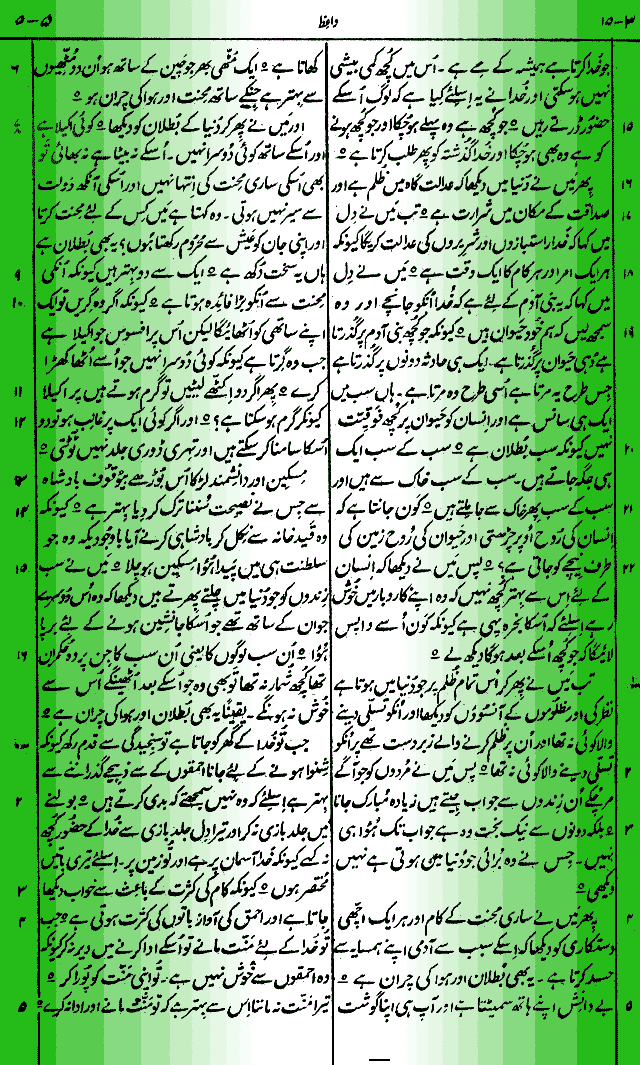
Ec:3:15: That which hath been is now; and that which is to be hath already been; and God requireth that which is past.
Ec:3:16: And moreover I saw under the sun the place of judgment, that wickedness was there; and the place of righteousness, that iniquity was there.
Ec:3:17: I said in mine heart, God shall judge the righteous and the wicked: for there is a time there for every purpose and for every work.
Ec:3:18: I said in mine heart concerning the estate of the sons of men, that God might manifest them, and that they might see that they themselves are beasts.
Ec:3:19: For that which befalleth the sons of men befalleth beasts; even one thing befalleth them: as the one dieth, so dieth the other; yea, they have all one breath; so that a man hath no preeminence above a beast: for all is vanity.
Ec:3:20: All go unto one place; all are of the dust, and all turn to dust again.
Ec:3:21: Who knoweth the spirit of man that goeth upward, and the spirit of the beast that goeth downward to the earth?
Ec:3:22: Wherefore I perceive that there is nothing better, than that a man should rejoice in his own works; for that is his portion: for who shall bring him to see what shall be after him?
Chapter 4
Ec:4:1: So I returned, and considered all the oppressions that are done under the sun: and behold the tears of such as were oppressed, and they had no comforter; and on the side of their oppressors there was power; but they had no comforter.
Ec:4:2: Wherefore I praised the dead which are already dead more than the living which are yet alive.
Ec:4:3: Yea, better is he than both they, which hath not yet been, who hath not seen the evil work that is done under the sun.
Ec:4:4: Again, I considered all travail, and every right work, that for this a man is envied of his neighbour. This is also vanity and vexation of spirit.
Ec:4:5: The fool foldeth his hands together, and eateth his own flesh.
Ec:4:6: Better is an handful with quietness, than both the hands full with travail and vexation of spirit.
Ec:4:7: Then I returned, and I saw vanity under the sun.
Ec:4:8: There is one alone, and there is not a second; yea, he hath neither child nor brother: yet is there no end of all his labour; neither is his eye satisfied with riches; neither saith he, For whom do I labour, and bereave my soul of good? This is also vanity, yea, it is a sore travail.
Ec:4:9: Two are better than one; because they have a good reward for their labour.
Ec:4:10: For if they fall, the one will lift up his fellow: but woe to him that is alone when he falleth; for he hath not another to help him up.
Ec:4:11: Again, if two lie together, then they have heat: but how can one be warm alone?
Ec:4:12: And if one prevail against him, two shall withstand him; and a threefold cord is not quickly broken.
Ec:4:13: Better is a poor and a wise child than an old and foolish king, who will no more be admonished.
Ec:4:14: For out of prison he cometh to reign; whereas also he that is born in his kingdom becometh poor.
Ec:4:15: I considered all the living which walk under the sun, with the second child that shall stand up in his stead.
Ec:4:16: There is no end of all the people, even of all that have been before them: they also that come after shall not rejoice in him. Surely this also is vanity and vexation of spirit.
Chapter 5
Ec:5:1: Keep thy foot when thou goest to the house of God, and be more ready to hear, than to give the sacrifice of fools: for they consider not that they do evil.
Ec:5:2: Be not rash with thy mouth, and let not thine heart be hasty to utter any thing before God: for God is in heaven, and thou upon earth: therefore let thy words be few.
Ec:5:3: For a dream cometh through the multitude of business; and a fool’s voice is known by multitude of words.
Ec:5:4: When thou vowest a vow unto God, defer not to pay it; for he hath no pleasure in fools: pay that which thou hast vowed.
Ec:5:5: Better is it that thou shouldest not vow, than that thou shouldest vow and not pay.